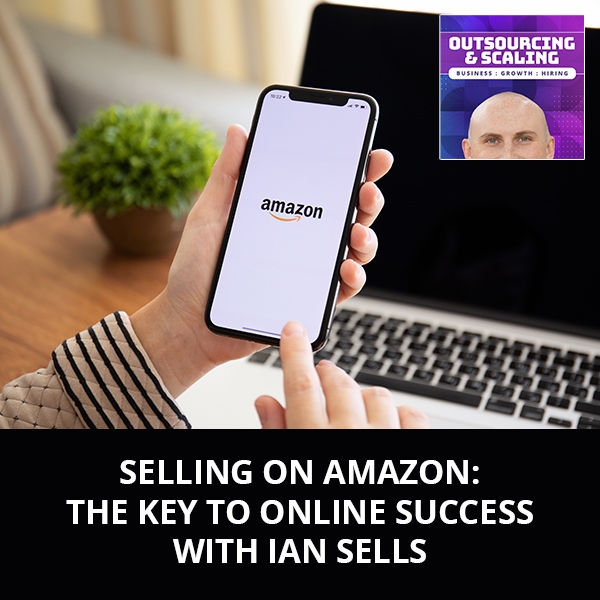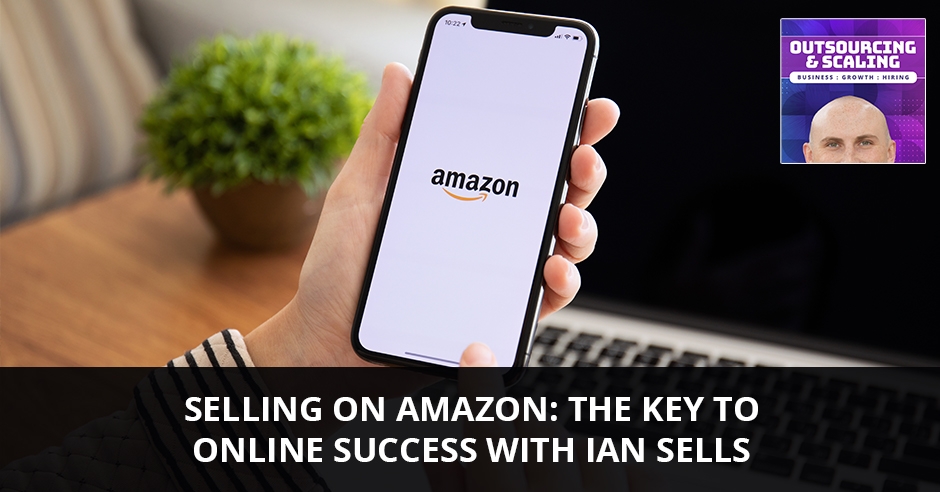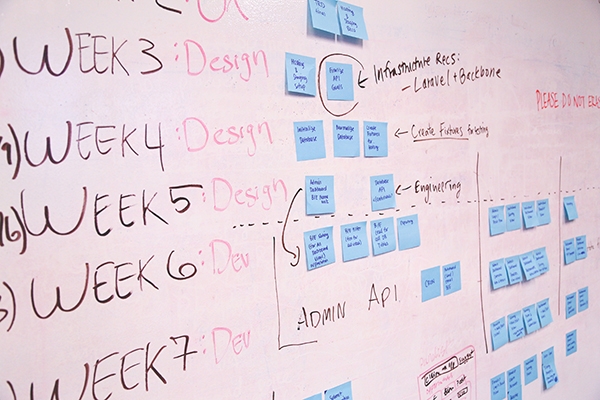


—
Listen to the podcast here:
[smart_track_player url=”https://www.podetize.com/statsapi/www.podetize.com/wp-content/uploads/fileuploads/11-5b145ef137b51b3d1af0633e9305c43d/07/2019/88c2ceec6b915d56439aa2f6df112884.mp3″ title=”Selling On Amazon: The Key To Online Success with Ian Sells” ]
Download the audio file here.
Selling On Amazon: The Key To Online Success with Ian Sells
We have a very special guest, Ian Sells. Ian, how are you doing?
I’m doing great.
Ian is a multiple seven figures seller. He is the owner of the Facebook group of million-dollar sellers called Million Dollar Sellers and the CEO of RebateKey. Ian, I want to talk about all that. I know you have a lot of awesome stuff going on. First, let’s take a gigantic step back. Talk to me what you were like growing up. Were you a straight-A student? Were you a hustler? Were you a rebel? Walk us through that a little.
I’ve always been on the hustle. I always figured out a way to make some money. I had a job. As soon as I could get a job, I was cleaning delis and working at the bagel shop. I took whatever I had. I bought some item, some toy or whatever. I was able to sell that toy for more money and buy another toy. Everybody was always like, “How does he do it?” My parents still look at me like, “How are you still doing this stuff,” since from day one.
Did you graduate high school and college? At what point did you start thinking about becoming an entrepreneur full-time?
I’ve always been the guy that comes up with ideas and takes charge of stuff, so I feel like I’ve always been an entrepreneur. I didn’t start being an entrepreneur totally until college. It was the point where I was trying to start little businesses. I had worked for little consulting gigs on websites or graphic design and got a taste of that stuff. In college, I turned to real estate. My first start was in real estate. I became a broker before I graduated from college and started working in 2004. I got in right when the refi boom was happening. Before graduating, I already made $80,000 and started buying houses and flipping them.
When did you come across Amazon? How’d you come across it?
I did real estate for quite a while. Back in 2012, I was looking for other things, trying to get out of that cyclical market that goes up and down. I was investing in a buddy’s business who was from college. He was selling on Amazon as well. He was having some friends put in a couple of thousand bucks, buys a product and split the profits. The product that we chose grew fast. Within about a year and a half, it had already been a million-dollar product. At some point, we decided to separate the business up. We sold that business and we each walked away with a little bit of money.
Hiring the right people is key.
How did you learn Amazon from the beginning? Was it trial and error? Back then, there weren’t that many courses, gurus or anything that.
That’s where I look back and go, “I could’ve been an anchor.” We were selling power banks and speakers when they were first coming on the scene. We went in a different direction. We started to go, “Amazon is great, but let’s try to go to retail.” We tried to go into Walmart and have outdoor products as well. We were trying to get on the shelves and chasing the next shiny object when Amazon was probably the thing we should’ve been focusing on the whole time. My partner had started on Amazon with $1,000 cash advance from his credit card. He bought some products, started selling and figured out the whole thing. I saw what he was doing. I was like, “That sounds great. Let’s do that together.” I learned a little bit from him. When we sold the business, I started my own on the side. That quickly grew and scaled up. That’s how I was out there on the internet seeking more information and reading from all the groups and all the gurus that were selling information. I’ve never bought any, but there was so much free content out there and interacting.
When did the idea of the Million Dollar Sellers come about? You’re passionate about bringing people together. I sponsored some of your events. I’ve spoken in the Facebook group. I met a lot of the people at conferences. They’re an awesome group of people trying to help each other. The average person view is, “I’m an Amazon seller. You’re an Amazon seller. We’re competition. We shouldn’t talk to each other.” You took a different approach. Can you talk about that?
It’s because I had the experience of scaling an Amazon business beforehand. I learned that I don’t have to reinvent the wheel. I learned in real estate as well to try to learn from your mistakes and other people so that you can go faster. I quickly realized, as we were scaling up from a brand-new company, that I need more top-level information. In all the groups that I was in, it was like, “Is this a good product? I have $500.” I like helping those people. I also wanted to have a close group of friends or people that I could share ideas with. We could talk about it at a little higher level. I joined a group. It was the $10,000 and up group. You had to do $10,000 of revenue to be in there. I quickly surpassed that and got to $50,000. I told the guy who was running the group, “You need to make it $50,000 and up the group.” He was like, “We’re good at $10,000. It’s fine.” “Do you mind if I do it?” He was like, “Sure, no problem.”
I started the group. I posted in the group. A couple of people flew over from the other group and it died out. At that point, somebody else a few months later was like, “There’s another group. If you’re doing $50,000, you should join.” All of a sudden, ten more people came over and we had twenty in the group. I started to ask questions even if I knew the answers and build the community. These were the guys that were answering all the questions in all the other groups. They were the ones that were experts but were out there helping other people. They felt connected and close. They felt they were among my colleagues. That’s how MDS started. We quickly changed it to $100,000 and up as everybody’s businesses scaled. It became $1 million and The Trailing Twelve revenue because, with Prime Day, you could do $100,000 in one day and not make any money. That’s how that started. It was like an organic thing that grew. We started bringing in great people from other groups. People started referring to their friends. That’s how it grew.
Are there any tips for someone growing and maintaining a Facebook group? I imagine it’s a lot of work getting it going, keeping it active and engaged and not letting it go stale.
There’s a whole process that I thought about while I was doing this. I started to see the real value of what I had. As that progressed, I started to put rules in place. I made a website and did all these things to try and segment our group from other people to make it special. One of the main things you have to do is build that community and make people feel comfortable. Make it something different and unique. You have to add a lot of value. That’s where it comes out. You’ve got to go in there. You can’t just ask for money and things like that. You give and give. All of a sudden, the tables flip and it’s like, “How can I help you?” That’s what happened.
You’re growing these Amazon businesses. You sell a business and got real estate going on. You’ve got Million Dollar Sellers and all the events that you put on through that. You’d think that’d be enough, but here you are starting another company, RebateKey. Talk to us about that idea, how it came about and where it’s at now.

The reality is I’m still a full-time seller. We’re always in our mastermind. We’re all day and every day talking about how do we improve upon what’s happening and what’s Amazon going to do next to change. We’re trying to stay top of mind and ahead of the game. One day, I was driving home and remembering when I used to work at Circuit City. You’d sell a computer and people would have to cut out the UPC and mail it in. We’d get $300 or $400 off their $1,000 computer. That’s how Compact and HP were doing it. They were doing these mail and rebates, not coupons at the register. It’s probably because they can inflate their numbers. Plus, they knew that people don’t always clean rebates. I said, “Why don’t we do that for Amazon?” It’s way better than coupons. They get full price sales. We’re going to get real buyers who want our products because they have to part with money. We could get them on a platform where we can communicate with them and get real feedback about our products. I came up with the idea and set it. Everybody was like, “That sounds great. Let’s do it.” One of the guys in our group, Leo, was like, “Let’s do this.” He was a developer. We put up a landing page and shared it with the MDS community. Within 24 hours, we raised $100,000 from our members and developed it. There are 30 of us involved. I’m just the CEO of it.
You talked a little bit about masterminds. How important has being a part of masterminds been for scaling your Amazon business? Are there any other tips for people reading who want to go from $100,000 to $1 million?
They’re invaluable, especially in the right ones. I’m in a business mastermind as well, locally in San Diego. You are connecting with other like-minded people levels up your mentality and mindset. You can ask questions to people who have already been through it. You’re not alone. You’re not doing this by yourself. As entrepreneurs, we’re always sitting behind the computers. If you’re not out at conferences meeting people, you’re by yourself. By having a good network of even five or ten people makes a huge difference. People can set you straight or say, “That’s crazy,” whereas you might be going the wrong direction. You can hear, “Use my template.” If you share a template with somebody else, they might share with you. Being in masterminds is the next step from being in these free Facebook groups and asking for information. Even though you might not know a lot, you could probably add some value to somebody’s life, business or even family or relationships.
You’ve got all these businesses going on. I’m assuming that you’re not just running them all by yourself. Talk to us about hiring. How big is your team? How are you structuring it?
I’ve been trying to use freelancers since the real estate days. I was doing a thousand posts a day on Craigslist with a virtual team in India. I was trying to build some websites. I never got that part of it, but it was great. We’re light years ahead of that. We’ve got a team in India and in the Philippines. I hired a few more people through you guys for marketing and support on a higher level, as we were trying to scale diversity. As far as doing everything, I can’t do it myself for sure. Hiring the right people is key.
Talk to me about what’s next. Are you constantly trying to think of different ideas and different businesses? Are you focused on what you’re doing now?
I always have to level-set back to focus on a couple of things versus trying to do all these different businesses. My focus is scaling on my Amazon brands. I’m getting rid of some dogs that I launched a few years ago and focusing on RebateKey and MDS group. We’re putting on events and things like that and trying to build a community even stronger than it already is, make it something that people want to be a part of. It’s not just about the people in it but also the conferences, the connections and the things that we can achieve as a group. I did a poll in our group. Out of 300 people, we represented about $2 billion of sales on Amazon. The power that a small group of people has is mind-blowing. I’m trying to figure out, “How do I harness that? How do I best use that for the Amazon community in general?” If we can be the voice, get connections and let that information flow down to the mainstream.
A lot of entrepreneurs reading probably have one business. They’re struggling to manage, lead or motivate people. How are you doing this across different businesses with different teams where you’re not spending 40 hours a week in one business but being pulled in a different direction and keeping all of them going forward, motivating them and leading them forward? How are you able to do that? What advice do you have for the readers?
You need to figure out how to focus if you’re not good at doing a lot of things.
You have to write things down. You have to create lists of tasks that have to be done in each of those businesses and put somebody on those things. Have them research it and give back to you like, “Here’s what I’m thinking. Here’s the report of all this information.” There’s too much for one person to do. When I’m trying to do things and I get frustrated, I stop and go to the whiteboard. I start writing down everything that is in my brain. I start to move it around and figure out, “Who can I give this task to?” They might not do it as good as you. They might do it better than you. Sometimes it’s better to list out all those things and get to work.
What’s next?
I have something special with the MDS community. RebateKey has a lot of legs to grow and expand in other marketplaces. I always say to imagine that you’ve got your product into Target. You use RebateKey to drive buyers to go into the store to buy it. You give them a check in the mail afterward versus doing it online. They go to Amazon, buy it and get a check in the mail. That army of people can be doing a lot of things to help spread word of mouth marketing to help drive sales and get the word out. RebateKey and MDS are my main focus.
Across this journey of being an entrepreneur and growing businesses, is there any mistake that stands out that the readers could learn from?
I made lots of mistakes. You do need to figure out how to focus if you’re not good at doing a lot of things. That’s where I see most people making mistakes. They try to do so many things but they’re not good at any of them. If you could take the time to become a product research expert, then just do that and hire somebody else to do the Facebook ads. You don’t have to be the expert at everything. Put a system in place to track it. That’s been helpful, creating those systems to track things instead of like, “Do this and fill out this spreadsheet. I want to see my cost per conversion and all that stuff.” I had all the information I need from the get-go. That’s one thing people need to focus on.
The other mistake I made was getting over-leveraged, trying to expand too fast. A lot of people make that mistake, especially in this business and real estate too. In this business, it grows so fast. You start to launch a lot of products. All of a sudden, everything starts stalking out because you don’t have enough cash to keep up with the growth. Every month, you take your profit and roll it back into buying twice as many units as you’ve bought the month before. While it’s good to scale up fast, it’s good to scale profitably. When you’re ready to leverage hard and you have your systems in place, that’s when it’s a good time to scale up.
Where do you see Amazon going? Are there any changes that you see on the horizon?
I try not to say too much about what I think is going to happen because it always changes. I’m not out there telling everybody what’s going on. I think that they’re going to figure out this review thing. They’re going to put some checks in place to keep the black hatters from manipulating the review platform. The trust is Amazon’s biggest asset. If Walmart had more trust on its platform, they’d probably do better. I think that’s going to happen. As far as growth, we’re still super new. Amazon is going to continue to add categories. I think they’ll be adding prescription drugs pretty soon. When that happens, a whole new wave of buyers will come on the platform because they’re going to make it so easy to get those pills or pill packs that you need. They’re still at the beginning of this thing. You’ve got to ride the wave and ride out the challenges of aces going down, black hat tactics and competition.

What would you say to someone that wants to get into Amazon? Do you think it’s saturated? Do you think there are still a lot of opportunities?
There are still opportunities. It’s not a $500 get-rich-quick scheme anymore. It never was, but you’ve got to be thoughtful about it. You’ve got to find a niche, do your research, find the right factory to make some improvements and build a nice-looking listing. You’re not just going to slap it up there and it’d be a me-too product. I have some of those products. They don’t do well. The ones where I put time and thought in and made it look like a real strong brand are the ones that are doing well. It’s still a great opportunity. I’m happy that people are still teaching others how to get in but don’t think it’s easy because it’s not.
What is one thing that some guru out there is teaching that you strongly disagree with?
I don’t know. I don’t follow them anymore. I get so much information from my mastermind that we’re not talking about who said what or what. We all have the data. If you have a question, you could find it out. I’m not trying to escape that question or sidestep it. There are some great guys out there selling information and they know what they’re talking about. There are some that don’t so you need to be careful as a consumer of that. Use your network and the people that you’ve connected with on online to build that trust. Make sure you filter out the information that’s not right.
Where can people find out more about you? What are you the most excited about going forward? You’ve already touched on that, but I’ll give you an opportunity to share more.
I’ll give you the base. If you’re a seller and not using RebateKey, you should check it out. It’s RebateKey.com. It’s free to list your products. We charge based on the number of rebates that are claimed. If you are a seller and you’re doing $1 million and over of revenue, you should join MDS. Apply to it. We have limited spots. We do interviews with everybody. If you do that and you hear about it on the show, definitely put in FreeUp as your referral source so we can make sure that we know where you’re coming from or how you heard about us. If you want to get in contact with me, you can hit me up on Twitter. Facebook is usually where I’m at, so look me up on Facebook.
Thanks so much for joining us.
Important Links:
- Million Dollar Sellers
- RebateKey
- RebateKey.com
- Twitter – Ian Sells
- Facebook – Ian Sells
About Ian Sells

- Multiple 7 figure seller
- Founder of MDS (Million dollar sellers)
- CEO of Rebate Key.
